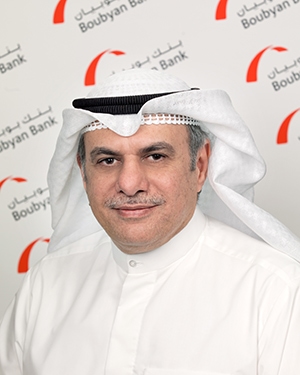While other banks look abroad for growth, Boubyan Bank CEO and vice chairman Adel Al Majed says Boubyan focuses closer to home.

Global Finance (GF): What is driving the growth of Boubyan Bank in the Middle East North African region?
Adel Al Majed: Despite the modest growth in the local market, Boubyan’s total assets grew by a compounded annual growth rate of 17% from 2010 to 2017. That growth was mainly driven by our financing portfolio, which grew by 19% during this period. Consumer and corporate finance grew by 41% and 13%, respectively, over the same period.
Boubyan Bank’s strategy focuses on organic growth within Kuwait by trying to pinpoint opportunities in the local market. We work to introduce new products and maintain a leadership position in innovative technology. We developed a deeper understanding of our targeted segment and identified its most promising subsegments. We constructed value propositions and offerings that are more relevant, flexible and supportive for our customers.
Our strategy also ensures that adequate investment is done on our human capital and that competent resources are retained. Without them, we would not have achieved this growth.
GF: How do you deal with regulatory standards such as anti-money laundering or international sanctions? Does it entail extra costs for you?
Al Majed: Faced with evolving and increasing AML laws, regulations and financial sanctions that imply stringent compliance requirements and severe repercussions in instances of noncompliance, we invested substantially in systems and human capital to deal with such regulations. This increased our cost structure. However, this cost is not comparable with the cost of noncompliance, which could have serious consequences, like punitive fines and damaged reputations.
We do our best to be increasingly proactive and vigilant in our daily operations, to deal with the conflicting and sometimes overlapping AML and sanctions regimes.
GF: What is your stance on fintech? Who are the potential users of fintech and how could it change banking in the MENA region?
Al Majed: The fintech sector is rising rapidly globally by taking advantage of new consumer technologies, such as mobile and cloud. According to Ernst & Young’s 2017 Fintech Adoption Index, one in three digitally active consumers is a fintech user. This is compared to one in seven back in 2015. That is significant enough for us to believe that fintech is reaching mass adoption.
In Kuwait and in the MENA region, the potential users are found in the young population who are demanding more and more digital-banking services. Now, financial institutions in the region are under increased pressure to adapt to those customers’ needs, while at the same facing the challenges related to regulations, hiring and retaining talent, as well as increasing investments.
GF: As an Islamic bank, what are your prospects for growth and expansion?
Al Majed: There are many reasons to anticipate that the industry will continue to grow rapidly. Islamic financial products and services are more competitive, and Muslims worldwide are continuing to opt for shariah-compliant products. We also increasingly see interest from non-Muslim customers.
Previously, Islamic banking used to grow based only on ethical foundations. Now, Islamic banks’ customers have become more demanding. The level of service and innovative products complement the ethical foundation, which provide more competitive advantages for Islamic banks.
GF: What role can the banks play in the postwar reconstruction of countries such as Iraq and Syria?
Al Majed: In coordination with international organizations such as the World Bank, the IMF and the Islamic Development Bank, commercial banks with regional and international operations can play an important role in supporting reconstruction and recovery of these countries. However, at Boubyan Bank our current strategy is still focused on organic growth within Kuwait.



